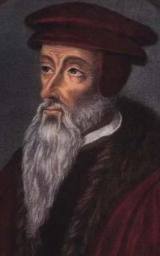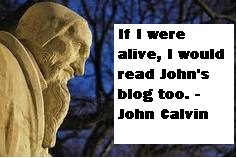 In an article entitled “Theologian for the Ages: John Calvin” Dr. Steve Lawson a renowned teacher, an ecclesiastical statesman, and a valiant Reformer, Calvin is seen by many as the greatest influence on the church since the first century. Apart from the biblical authors themselves, Calvin stands as the most influential minister of the Word the world has ever seen. Philip Melanchthon revered him as the most able interpreter of Scripture in the church, and therefore labeled him simply “the theologian” (J. H. Merle d’Aubigné, History of the Reformation in Europe in the Time of Calvin, Vol. 7 [1880; repr., Harrisonburg, Va.: Sprinkle, 2000], 82). And Charles Spurgeon said that Calvin “propounded truth more clearly than any other man that ever breathed, knew more of Scripture, and explained it more clearly” (C. H. Spurgeon, “Laus Deo,” The Metropolitan Tabernacle Pulpit: Sermons Preached by C. H. Spurgeon, Vol. 10 [Pasadena, Texas: Pilgrim, 1976], 310).
In an article entitled “Theologian for the Ages: John Calvin” Dr. Steve Lawson a renowned teacher, an ecclesiastical statesman, and a valiant Reformer, Calvin is seen by many as the greatest influence on the church since the first century. Apart from the biblical authors themselves, Calvin stands as the most influential minister of the Word the world has ever seen. Philip Melanchthon revered him as the most able interpreter of Scripture in the church, and therefore labeled him simply “the theologian” (J. H. Merle d’Aubigné, History of the Reformation in Europe in the Time of Calvin, Vol. 7 [1880; repr., Harrisonburg, Va.: Sprinkle, 2000], 82). And Charles Spurgeon said that Calvin “propounded truth more clearly than any other man that ever breathed, knew more of Scripture, and explained it more clearly” (C. H. Spurgeon, “Laus Deo,” The Metropolitan Tabernacle Pulpit: Sermons Preached by C. H. Spurgeon, Vol. 10 [Pasadena, Texas: Pilgrim, 1976], 310).
Calvin was born on July 10, 1509, to Gerard and Jeanne Cauvin in the French cathedral city of Noyon, some sixty miles north of Paris. Gerard was a notary, or financial administrator, for the Roman Catholic bishop of the Noyon diocese and, thus, a member of the professional class. At age fourteen, John entered the leading educational institution of Europe, the University of Paris, to study theology in preparation for the priesthood. There, he was immersed in the principles of the Renaissance, humanism, and scholarship. A serious and remarkably learned young man, he graduated with a master’s degree (1528).
MY HEART I GIVE THEE, LORD, EAGERLY AND EARNESTLY.
Soon after Calvin’s graduation, Gerard fell into a conflict with the bishop of Noyon, and this falling-out with the church caused him to redirect his brilliant son to the study of law at the universities of Orléans (1528) and later Bourges (1529). Calvin learned Greek and sharpened his skills in analytical thinking and persuasive argument, skills he would use with great effect in the pulpit in Geneva. But when Gerard unexpectedly died (1531), Calvin, twenty-one years old, moved back to Paris to pursue his great love, the study of classical literature. He would later return to Bourges, where he completed his legal studies and received his law degree in 1532.
Suddenly Converted
While he was a student at the University of Orléans, Calvin encountered some of the early reform ideas through Martin Luther’s writings, which were widely discussed in academic circles. Subsequently, Calvin was converted to Christ. Calvin recorded a testimony of his conversion in the preface to his Commentary on the Book of Psalms (1557):
To this pursuit [of the study of law] I endeavored faithfully to apply myself, in obedience to the will of my father; but God, by the secret guidance of His providence, at length gave a different direction to my course. At first, since I was too obstinately devoted to the superstitions of popery to be easily extricated from so profound an abyss of mire, God by a sudden conversion subdued and brought my mind to a teachable frame, which was more hardened in such matters than might have been expected from one at my early period of life. Having thus received some taste and knowledge of true godliness, I was immediately inflamed with so intense a desire to make progress therein, that although I did not altogether leave off other studies, I yet pursued them with less ardor. (John Calvin, Commentary on the Book of Psalms, trans. James Anderson [Grand Rapids: Baker, 2003], 1:xl–xli)
In November 1533, Nicolas Cop, rector of the University of Paris and a friend of Calvin, preached the opening address of the winter term at the university. The message was a plea for reformation on the basis of the New Testament and a bold attack on the Scholastic theologians of the day. Cop encountered strong resistance to his “Luther-like” views. Calvin is believed to have collaborated with Cop on the address, as a copy of the manuscript exists in Calvin’s handwriting. As a result, Calvin was forced to flee Paris before he could be arrested. He withdrew to the estate of Louis du Tillet, a well-to-do man who was sympathetic to the Reformation cause. There, in du Tillet’s extensive theological library, Calvin read the Bible along with the writings of the Church Fathers, most notably Augustine. By hard work, genius, and grace, Calvin was becoming a self-taught theologian of no small stature. Continue reading

